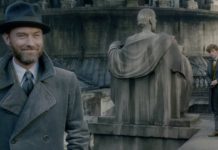International TV and movie audiences have come to know Tomer Capone as an interesting and versatile character. Capone has captivated audiences all over the world with his captivating roles in Israeli hits like “Fauda” and “When Heroes Fly” and his lead part as “Frenchie” in Amazon Prime’s popular series “The Boys.” It is both interesting and motivating to see how he went from being an Israeli soldier to a famous actor. We talk about his life, work, and the things that have made him who he is in this exclusive interview.
The Spark of Love
Your story from a small town in Israel to becoming a famous actor around the world is truly inspiring. What first made you want to be an actor, and how did you stay inspired over the years and through different experiences?
AWhat a lovely question. In my mind, I can almost see how it all began and how I got to be here, speaking English to you, which wasn’t even a dream ten years ago. There have been both good and bad times in my life. To answer your question directly, I became interested in acting because I was looking for something different. I didn’t get to see many artsy things as a child in a small town in Israel. Most of the time, I was around sports and traditional study. I learnt about American society through books, music, and movies, though, thanks to my wonderful grandfather. He always took me to see new films. I remember seeing “Edward Scissorhands” and “Jurassic Park” with him. Those experiences blew my mind. It felt like discovering a magical world, and it made me feel something.
But becoming an actress didn’t seem like a realistic goal. I joined the Israel Defence Forces as a soldier after high school. The service changed me by pushing me to my limits and teaching me how to be disciplined, strong, and work with others. Living two lives at once—one with rules and stress, and the other with hopes for a different world.
I worked with animals and travelled through Thailand and India after my service. I read a lot and learnt about other countries. During this time, I became more interested in telling stories. Bowie and hip-hop music had a big impact on me and helped me learn English. I met a wonderful person who is now my boss and teacher. He heard me singing songs by Willie Nelson and Bob Dylan and told me I should think about becoming an actor. He got me interested in plays by Tennessee Williams and Shakespeare, which changed my life.
I chose to take a short acting class in Tel Aviv when I was 25 years old, even though it seemed like too late to start an acting career. I thought that the worst thing that could happen on my once-a-week trip from northern Israel to Tel Aviv was that I’d meet some new people. But I became crazy about it. I watched every episode of “Inside the Actors Studio” and all of Tarantino’s, Scorsese’s, Coppola’s, and other great films. When I was working on the field, riding my motorbike, and practicing my lines, I learnt how to do monologues. I got into one of Israel’s best acting schools and chose to follow my dream with all my heart.
It wasn’t easy, but my drive and intensity kept me going. When I tried out for the best shows in Israel, like “Hostages” and “When Heroes Fly,” Netflix was adding more shows from other countries. I got to where I a`m now by being in the right place at the right time. That’s how I got to talking to you.
It has been an amazing journey, full of difficulties and happy accidents. Everything I’ve done, from being in the service to traveling, has changed how I act and made me a better person and an honest actor.
Getting to be an international star
Q: As a star of highly acclaimed shows like “Fauda” and “When Heroes Fly,” you’ve had a big effect on people in Israel and around the world. What special problems did you run into when you switched from working on Israeli shows to big American shows like “The Boys”?
AThe change from working on Israeli shows to big American shows like “The Boys” was both exciting and scary. There is a big change in the business and in culture. Hollywood productions are huge, and people have high hopes for them.
At first, 90% of the problem was dealing with the stress of having to do a good job and the thrill of being in Hollywood. It’s a new world, and I had to deal with my fears. Fear can be a very interesting thing for an actress to feel. You should learn how to dance with it, accept it, and use it to improve your performance instead of getting in the way of it.
In the years before “The Boys,” I worked on a $50 million pilot for NBC. I remember being both scared and excited as I stood there. As soon as I heard the word “action,” I knew that my job had begun, no matter how big or small the project was. The work stays the same: performance that is honest and real. What I learnt here gave me a lot of freedom.
The best and tastiest parts of acting happen between “action” and “cut.” Everything else is less important. Big ads and other perks that come with a big production are great, but I would have played “Frenchie” for free because it’s not about the money, it’s about the craft.
About “The Boys,” the story of how I got the part of Frenchie is pretty lucky. Eric Kripke, who made the show, was having a hard time finding Frenchie. He called his mother one day and told her about the problem. He should check out this “very nice boy.” She had just watched “When Heroes Fly” on Netflix. That’s how he came up to me. It’s funny that they didn’t even think about hiring an actor who wasn’t French. They told me the story when they went to Israel, and I joked that I should sit next to his mum at the movie opening.
The change was hard, but there were also many lucky times along the way. When I learnt that the real fun is in the skill itself, my worry about whether it would work went away.
“Slingshot” opens up new worlds.
When “Slingshot” comes out soon, what can you tell us about your role and what it was like to work with big names in Hollywood like Casey Affleck and Laurence Fishburne?
“Slingshot” is a fun project that I can’t wait for everyone to see. In this sci-fi movie, three astronauts are sent to Mars to find water, but things don’t go as planned. As the story goes on, the character I play, an astronaut, goes through a lot of mental and emotional damage.
It was strange to work with Casey Affleck and Laurence Fishburne. I’ve looked up to these artists for years, and getting to work with them was a dream come true. It goes without saying that both Laurence and Casey are very skilled and kind. They added so much depth and skill to the set, making it a lively and intense place to be. We filmed for long hours in a spaceship set, and because our characters’ mental states were so intense, it often felt like we were in a mental hospital in space.
Because Laurence Fishburne is such a celebrity, working with him was like getting acting lessons every day. He has a unique presence and weight, and he was very open and willing to work with others. On the other hand, Casey Affleck is amazingly good at adding subtlety and character to these roles. I was motivated to improve my playing after seeing him work at the studio.
One of the best things about shooting “Slingshot” was getting to know each other better. Even though the subject was hard, everyone respected each other and wanted to make the best movie they could. Everyone brought their own special skills to the table and made something amazing together, it was like being in a rock and roll band.
Overall, working on “Slingshot” was a great experience, and I can’t wait for people to see the finished result. The project is going to be interesting and different from anything I’ve ever done before. I hope people enjoy it as much as we did making it.
For people who want to be actors:
What tips would you give to young actors who want to make it big in their home countries and around the world, since you won an Oscar (Ophir) Award in Israel?
As a young person who wants to be an actress, I tell you to hold on to your dream. It’s easy to give up when you get turned down or when the business is hard. “Fate was looking straight at me and no one else,” Bob Dylan once said. That’s how it seemed to be.” This really hits home for me. You should believe in yourself and your goals, but don’t shout it from the clouds. Take care of it alone and let it grow.
Stay true to your work. Have faith in your skills and the work you’ve done. Fear is a part of the trip, but you need to learn how to dance with it instead of letting it take over. Fear is a strange force that can either hold you back or move you forward. Accept it and use it to power your efforts.
Do not forget that being easy is the easiest thing in the world. Honesty and relationship are important in acting. Your job is to give a real act whether you’re on a big-budget movie set or a small independent project. No matter how big or small the process is, the same rules apply.
When I read Bob Dylan’s book, I learnt something that helps me every day. He talked about how dreams are fragile and how the best way to care for them is in private and quiet. Keeping your dreams close and not looking for approval from other people is a pure thing to do. This helps you keep your mind on your goal and stay on track.
Wishing all of you who want to be artists the best of luck! Remember your dreams and follow your heart. There will be ups and downs along the way, but you will find your way if you stay true to your craft and welcome the challenges.
Do not forget that being easy is the easiest thing in the world. Honesty and relationship are important in acting.
A Look Ahead
In terms of the future, what do you have planned? Are you really excited about any new projects or initiatives? Is there a dream role or theme you can’t wait to explore next?
AThere are a lot of things that could happen in the future, and I’m really looking forward to a few projects. Right now I’m filming a romantic comedy in Hebrew in Israel, which is different from the parts I usually play. I’ve never danced and sang on screen before, but I have to do a lot of it for this job. Because of how bad things are right now, I wanted to do something fun that would make people happy. It’s my way of giving back and making people happy and giving them a break.
When it comes to dream roles, I’m always up for new tasks and types of films. It’s important to keep changing and finding fresh ways to tell stories that people will connect with.
Last Thoughts
Q: This talk has been so much fun. Is there anything else you’d like to say before we end?
AThank you for giving me this chance to share and think about my trip. I hope my story can give other people ideas. Also, let’s all work for peace and understanding, especially now when things are hard. Hold on to your hopes and dreams.
Not only is Tomer Capone very talented, but he also approaches life and art with honesty and heart. His story shows how important it is to be strong, passionate, and never give up on your dreams. He keeps captivating people all over the world, and we can’t wait to hear many more of the stories he has yet to tell.
























